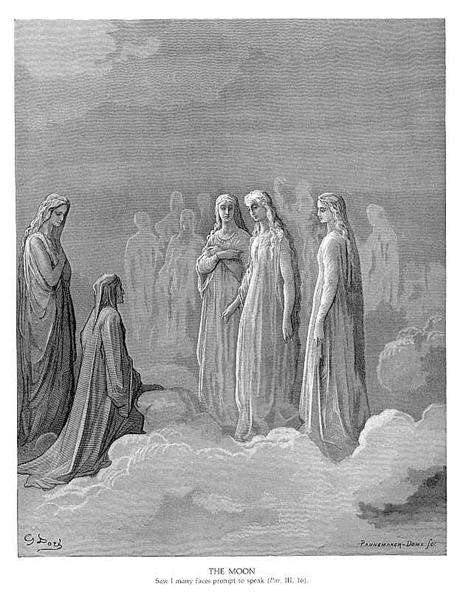Canto
I
After
Dante (the author, not the character) gives glory to God, he points out that
one who returns from up high can neither fully explain nor fully grasp his
experience, but he will do what he can.
In emulation of the classics, he invokes Apollo, the god of the sun, to
help him in this effort. It is now noon
and Dante (the character) turns to loom at Beatrice, who is staring at the
sun. The light reflecting off her eyes
pours into Dante’s soul so strongly that he can only sustain it for a short
time. But as he continues to gaze on
her, he feels changed within. Through
her, he can see the heavens spinning like wheels, bright as the sun and on
fire. He feels his body lifting and
asks, how could this be? Beatrice
explains that it is natural to be lifted toward the heavens, and that it is
unnatural—because sin is the unnatural state in man—to be held down to earth.
Canto
II
In
a naval metaphor, Dante (the author) warns the reader that not all are fit to
follow him on this journey. Because of
their innate thirst for God, the two pilgrims (Dante the character and Beatrice
his guide) rise with the speed of an arrow shot to the first heavenly sphere,
the moon. Dante asks Beatrice, what do
the dark spots on the moon signify? She
turns the question on him and asks him what he thinks they are. After Dante answers incorrectly, Beatrice
goes on to explain first why he is wrong (it has nothing to do with rare or
dense matter) and second proposes an experiment of mirrors to arrive at the
truth. If the mirrors are staggered,
then a light shining into them appears different size but the original light is
the same for each mirror. The
differences in light and dark coloration on the moon is due to the different
distribution of graces God has used to create the universe, though it’s the
same light that shines on all. It is the
matter which has varying capacity to absorb it.
Canto
III
As
Dante was about to confess his error on the moon spots, he sees the outline of
faces as if in the bottom of a pool of water.
The faces are all eager to speak to him.
Beatrice explains to him these beings are assigned under the sphere of
the moon—the moon associated with inconstancy—because they in life failed in
maintaining their vows. She urges him to
speak to them, and he finds the one who speaks back to be his cousin-in-law,
Piccarda, mentioned in Purgatorio (cantos XXIII & XXIV) when Dante met her
brother and his friend, Donato Farese. In
life she had vowed to be a nun but was forced out of the convent by her other
brother to marry for political reasons.
Dante asks her if she is content to be in the lowest sphere of heavenly
blessedness. She responds that she has
no desire for more, that she would not be blessed in the first place if her
will was discordant with God’s. She
replies with the famous line, “In His will is our peace.” She speaks of the spirit beside her,
Constanza, the Empress and wife of Henry VI, who was also pulled out of a
convent to marry. So both have failed in
keeping their religious vows, though both forced. Piccarda then fades into the mist, singing Ave Maria.
Canto
IV
Still
at the sphere of the moon, Dante (the character) is perturbed by two equally
perplexing implications of his encounter with Piccarda. Beatrice reads his mind and formulates for
him the two questions at the root of Dante’s confusion. She answers the second question first by
explaining that these souls do not reside in these heavenly spheres but appear
to him at the sphere as a sign to reflect the distinct heavenly graces that
people receive. These spirits at the
moon reside in Empyrean with all the other spirits in heaven but here reflect
the lower rank they received. This, she
continues, is in complete contradiction to what is generally understood on
earth. He then answers the first
question, pertaining to the justice of people forced from their vows being of
lower rank. It is true, they were
forced, but nonetheless their wills to maintain their vows was incomplete. Their will could have found an escape or even
death to uphold their vows. Satisfied,
Dante asks a third question, can a person make up in some other way for a vow
left unfulfilled? Beatrice looked at
Dante with eyes so radiant that it almost overpowered him.
Canto
V
Beatrice
first addresses Dante's inability to directly look at her, telling him that she
has flamed out more brightly because having moved closer toward God, she has
more perfect vision. Then she
reformulates his question on whether a vow left unfulfilled can be made
up. Beatrice explains that one's free
will given to God in a sacred pledge, one sacrifices further freedom. The only allowable substitution for an unfulfilled
vow must be of a significantly greater vow granted through God's representative,
the Church. She cautions about making
foolish vows. As fast as an arrow shot
the two rise up out of the moon and reach the sphere of Mercury. He sees a number of spirits there as if they
are fish in a pond, and one approaches to speak to him. He tells Dante that he and the spirits around
him are on fire from the light from heaven, and then asks Dante whether he
would like to receive some of this light.
Dante responds that he doesn't know who the spirit is and why he is
under the influence of this sphere. With
apparent joy, the spirit glows even brighter.


No comments:
Post a Comment